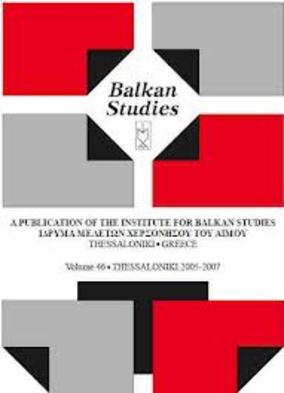Historical perceptions of Greco-Macedonian ethnicity in the Hellenistic Age
Part of : Balkan studies : biannual publication of the Institute for Balkan Studies ; Vol.36, No.2, 1995, pages 205-222
Issue:
Pages:
205-222
Section Title:
Articles
Author:
Abstract:
Whatever the perceptions and problems of Greek and Macedonianethnicity among themselves in the Age of Philip and Alexander, thosequestions took on their own dynamics in the Hellenistic period.Partially because of the expanded orbit of their own Hellenic worldfollowing the conquests and death of Alexander, and largely because theprincipals were forced to deal with large numbers of people for whomthe traditional ethnic differentiation between the two was essentiallymeaningless, the distinctions and barriers between Greeks and Macedoniansbroke down. Demetrius Poliorcetes could still reorganize a“League of Corinth” to aid the Antigonid cause in Greece in 302 B.C.,and the propaganda slogan of “freedom and autonomy” for the Greekcities (έλευθερία καί αυτονομία) was used throughout the period, but inits political rather than ethnic sense.By the end of the Third Century, Polybius (quoting from the treatybetween Hannibal and Philip V) referred to the exchange of oaths between“Macedonia and the rest of Greece” (7.9.3) and Carthage to upholdthat treaty’s obligations, in what clearly was an official formulaaccepted by both the Carthaginians and Macedonians. Likewise, theAchamanian envoy Lykiskos (again in Polybius), addressing the Spartanson the Aetolian threat, spoke of the politics and rivalry amongGreek states, but in doing so specifically stated that Achaea andMacedonia were of the same people (όμοφύλους) (9.32.7). Whetherdealing with external or internal threats, the ethnic perceptions of theGreeks and Macedonians had become inclusive. Finally, despite theRoman organization of a province of Macedonia separate from Greecein the Second Century, Strabo prefaced his treatment of Macedonia inthe First Century with the statement that Macedonia was part of Greece,but then had to go on to justify placing it topographically in the studywith Thrace (7.9). Clearly a transformation had occurred in which Macedonia as part of Greece became the standard paradigm, and anydeviation from that must be explained.
Subject:
Subject (LC):
Keywords:
Ελληνο-Μακεδονική εθνότητα, Ελληνιστική περίοδος




